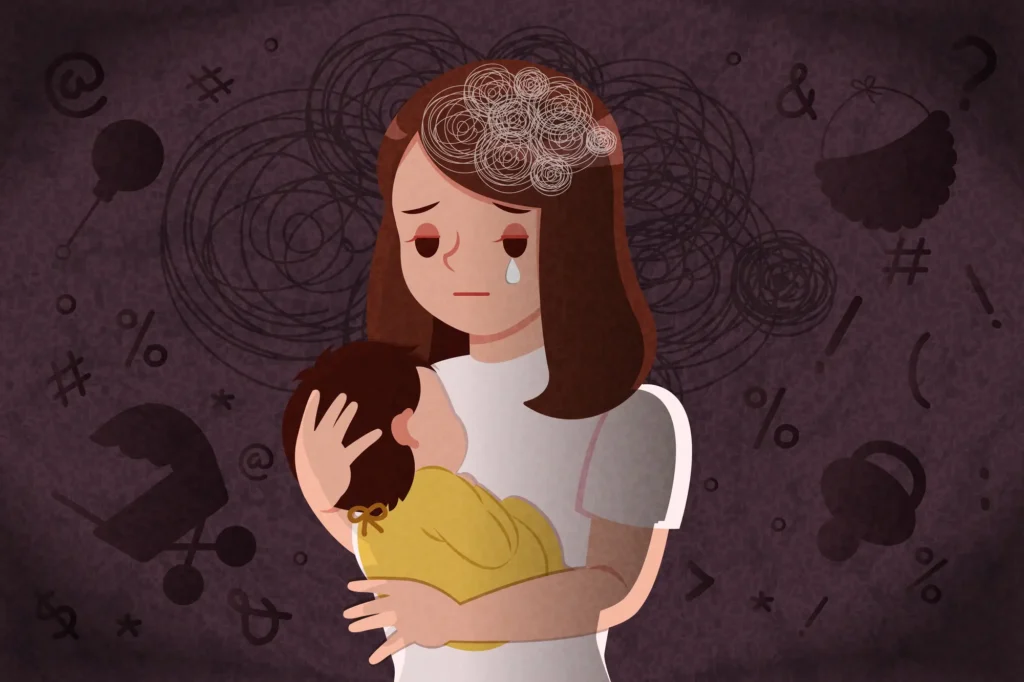Excessive worrying that occurs after childbirth or adoption is known as postpartum depression and anxiety. Individuals with postpartum anxiety may experience persistent nervousness or panic attacks. If you or someone you know is experiencing symptoms of postpartum anxiety, it’s important to get help from a professional; but first, let’s get to know postpartum anxiety, its symptoms, and treatment options.
What Is Postpartum Anxiety?
Postpartum depression and anxiety, often experienced following childbirth or becoming a parent, can be overwhelming. While it’s normal to feel stressed after welcoming a new baby, postpartum anxiety can lead to uncontrollable and persistent nervousness. This anxiety may manifest as excessive worrying about unlikely scenarios, sometimes without a specific cause. For example, you may constantly feel that something is wrong without being able to pinpoint the reason.
It’s important to note that postpartum depression and anxiety are not the same, although they share many symptoms
What Are the Symptoms of Postpartum Anxiety?
Your body reacts to danger or threats with anxiety. Postpartum anxiety can make you feel as though you or your child are constantly in danger, triggering persistent anxiety or fear. Your body responds to this ongoing anxiety by exhibiting various symptoms.
There are three main categories of signs of postpartum anxiety:
Physical Signs of Postpartum Anxiety
- Sleep disturbance.
- Palpitations or a faster heartbeat.
- Upset stomach or nausea.
- Being out of breath or having trouble breathing.
- Appetite decline.
- Difficulty remaining motionless.
- Tense muscles.
Emotional Signs of Postpartum Anxiety
- Difficulty relaxing or staying calm.
- Racing thoughts, especially about worst-case scenarios.
- Preoccupation with irrational worries or unlikely events.
- Difficulty concentrating or being forgetful.
- Intolerance.
- Feeling tense or constantly on edge.
Behavioral Signs of Postpartum Anxiety
- Avoiding specific activities, people, or places.
- Being excessively cautious in non-dangerous situations.
- Repeatedly checking things.
- Feeling the need to be in control.

If you or a loved one is experiencing symptoms of postpartum anxiety, reach out to a mental healthcare professional for support. Bespoke Treatment offers high-quality mental health treatment services to residents of California.
What Causes Postpartum Anxiety?
According to medical professionals, there are a few possible causes of postpartum anxiety:
Hormonal Changes
The sudden drop in hormones following childbirth can lead to mood swings or an exaggerated stress response.
Sleep deprivation
Taking care of newborns can require round-the-clock care. This constant demand for care can be physically and emotionally exhausting for new mothers
Feelings of Responsibility
Individuals may experience intense feelings of duty to care for and protect their newborn, causing constant feelings of fear and anxiety.
Stressful Events
Your anxiety may be triggered by specific events experienced by you and your baby, such as nursing difficulties, a challenging pregnancy, or a stressful birth.

Other risk factors that increase your chances of experiencing postpartum anxiety include preexisting medical conditions and traumatic experiences.
How Is Postpartum Anxiety Treated?
Your healthcare provider will recommend postpartum anxiety treatment based on your medical history, symptoms, and whether you are breastfeeding. Mild cases may improve with changes to daily routines or talking with a counselor to reduce symptoms. Medication might be an option if your anxiety worsens or significantly impacts your daily life.
Cognitive Behavioral Therapy (CBT) For Postpartum Anxiety
Cognitive Behavioral Therapy (CBT) is the standard treatment for postpartum anxiety. Therapists and psychologists use CBT to help you identify and change negative thought patterns. Through CBT, you can develop healthier thought patterns and behaviors, allowing you to overcome postpartum anxiety.
typically involves several one-on-one sessions. Your therapist or counselor will help you develop more effective coping mechanisms for stress and anxiety during these sessions, using a question-and-answer style. They may also address the emotions and challenges specific to the postpartum stage.
(833) 646-0763
Rediscover Peace After Childbirth With Bespoke Treatment
If you are searching for postpartum anxiety treatment options in Los Angeles and Santa Monica, Bespoke Treatment is the right place for you. Start your healing journey to enjoy every moment with your newborn.
Get StartedWhat Medications Are Used For Postpartum Anxiety?
For postpartum anxiety and depression, selective serotonin reuptake inhibitors (SSRIs) are the most commonly prescribed and extensively studied medications. SSRIs work by increasing serotonin levels in the brain. Serotonin acts as a messenger between nerve cells and is reabsorbed after use. SSRIs prevent this reabsorption, ensuring that more serotonin is available to transmit signals between nerve cells.
Similarly, serotonin-norepinephrine reuptake inhibitors (SNRIs) also work by increasing specific neurotransmitters in the brain.
Other medications, such as norepinephrine and dopamine reuptake inhibitors (NDRIs), monoamine oxidase inhibitors (MAOIs), and tricyclic antidepressants (TCAs), can also be used to treat anxiety. However, due to their minimal side effects, SSRIs are usually the preferred treatment.
It’s important to note that every medication has the potential for side effects. Before starting any medication, discuss the benefits and risks with your doctor. If you are nursing or intend to start nursing, inform your doctor so they can prescribe a medication that is safe for nursing.
How Can I Reduce the Risk for Postpartum Anxiety?
There are times when you can’t prevent postpartum anxiety. It’s not your fault, and you didn’t do anything to cause it. If you have a history of anxiety or depression, or if you’re aware of specific triggers from the past, talk to someone during pregnancy.
Speaking with a counselor and learning coping mechanisms before childbirth can reduce the intensity of anxious thoughts during the postpartum period.











